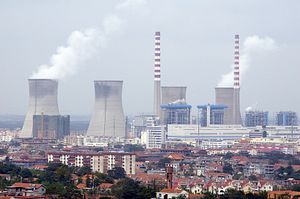In its pursuit of a more modern and internationally competitive economy, China has adopted so-called “drawing in” and “going out” policies aimed at attracting foreign technological expertise while simultaneously establishing a greater Chinese presence in foreign markets. These policies have taken root in China’s energy strategy, and could help to address the nation’s rapidly increasing energy demand and worsening environmental conditions. China has experienced notable success in the indigenization of renewable and low-carbon energy technologies domestically. However, it has not yet seen similar success in its efforts to enter low-carbon energy markets outside its borders.
Recently, China has faced a number of setbacks which demonstrate several countries’ apprehension at the prospect of Chinese involvement in their energy infrastructure. Last week, the Australian government threw a wrench into the plans of China’s State Grid Corporation and Hong Kong’s Cheung Kong Infrastructure Holdings by preliminarily barring their bids for a controlling stake in Ausgrid, the country’s largest electricity network. This came just weeks after a similar decision by the U.K. government to postpone approval of the Hinkley Point C nuclear reactor project pending a comprehensive review of the plans. In both instances, officials have cited security concerns surrounding Chinese involvement in British and Australian energy infrastructure as primary reasons for the countries’ hesitance to conclude the deals. Whether or not these worries are well-founded, they constitute a significant obstacle to Chinese energy companies’ international ambitions.
While some critics of the Hinkley project—including Nick Timothy, Prime Minister Theresa May’s joint chief of staff—have argued that CGN’s involvement could allow the Chinese to shut down the U.K. power grid at will, others believe that the risks of Chinese participation in Hinkley could be less nefarious, but equally consequential. Such critics argue that, even in the absence of the James Bond-esque tactics touted by Timothy, dependence on China for the financial and technological resources necessary to run the U.K.’s nuclear power program would give China a great deal of control over a vital component of the country’s future. Moreover, quality concerns surrounding “Made in China” products certainly extend to nuclear reactors, and the fact remains that China has not yet established itself as a trustworthy exporter of nuclear-related goods and services. In light of these facts, the May administration has taken a much more cautious approach to the Hinkley project than its predecessor.
In order to establish credibility in the eyes of its would-be international partners, China would do well to highlight the recent advances it has made in its own energy sector. For example, in the past several years, China has gained substantial experience in the design, construction, and operation of nuclear power plants employing so-called “third generation” nuclear technologies—the safest and most efficient commercial nuclear technologies to date. While the third generation European Pressurized Reactors (EPRs) planned in Finland and France have been subject to decades-long delays and financial uncertainty, the EPRs being built by CGN in Guangdong province are proceeding more or less according to schedule and are slated to begin commercial operation before the end of 2017.
In this regard, CGN’s stake in Hinkley C (which will make use of EPRs) can be viewed as an asset rather than a liability. In a statement published in the Financial Times following the postponement decision, Chinese Ambassador to the U.K. Liu Xiaoming asserted that “[in the Hinkley Project] the U.K. could not have a better partner than CGN.” He went on to urge the British government to come to a decision soon so that the project could proceed without further delay.
The ambassador’s call to action highlights the importance of the project in the eyes of the Chinese. It suggests that China’s stake in Hinkley Point and other international energy projects extends beyond the associated financial costs and benefits. If approved, Hinkley Point will be the largest and most expensive nuclear construction venture in the world, and having CGN’s name attached the project would be a major step in establishing China’s credibility in international energy development.
Unfortunately for Beijing, it seems that while Chinese energy companies may have the financial and technical capacity to “go out” into foreign markets, they will not be able to do so without establishing the trust of their host nations. China will face difficulty in further developing its presence in the energy markets outside its borders as long as its motivations for doing so continue to be perceived as dubious.
Mykael Goodsell-SooTho is an analyst at Nicobar Group (a Shanghai-based consulting firm that specializes in market-entry strategy and business development for international companies seeking to enter the Chinese civil nuclear market) and a student at the Hopkins-Nanjing Center for Chinese and American Studies, pursuing an MA in international studies with a concentration in energy, resources, and environment.
































